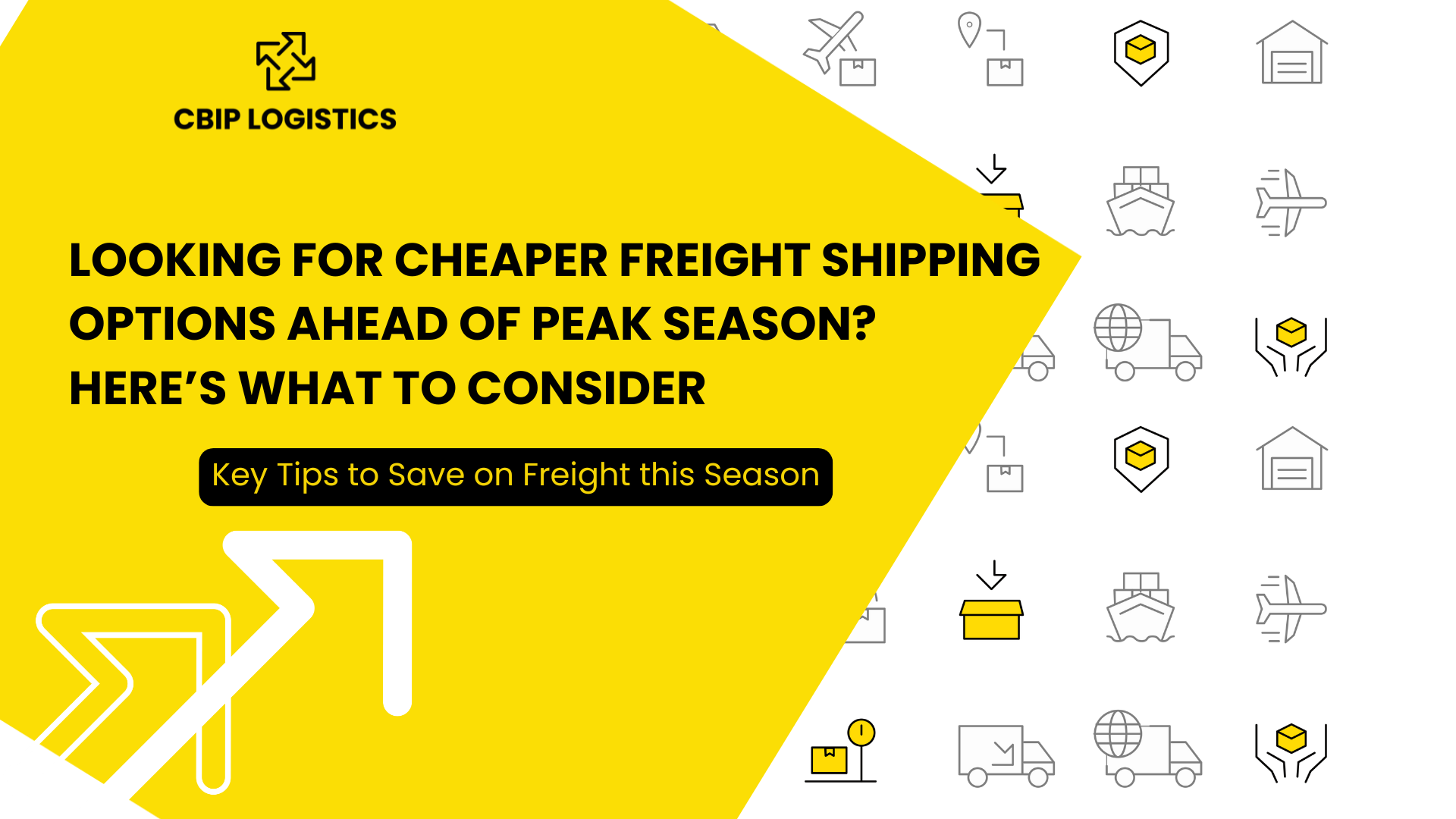Looking For Cheaper Freight Shipping Options Ahead of Peak Season? Here’s What to Consider

When fall rolls around, import volumes start rising fast — and so do freight rates.
Demand-based surcharges and fees will bring down your holiday earnings if you aren’t careful, so it counts to do your homework when it comes to freight shipping around peak season.
Considering all the re-routing due to geopolitical factors, it’s particularly important right now to do what you can this fall to keep your freight shipping costs low. If you are worried about rising freight rates this fall, we have some advice on how to pay less and plan strategically. Read on for our tips!
Read about CBIP's Adaptable 4PL Logistics Services
The pathway to cheaper freight shipping options
When you are shipping freight, there are a few important ways you can save money. However, each one is not without its downsides. Let's look at the three ways to get cheaper shipping, their downsides, and then some ways to make them easier.
Shipping in bulk
If you can ship a large amount at once, you may have the opportunity to negotiate volume-based discounts with carriers.
Unfortunately, it’s inconvenient for many e-commerce brands to ship large volumes at once. Storage can be expensive and difficult to coordinate, and low demand could result in a bunch of old inventory sitting in the warehouse that you can’t sell.
On top of that, squeezing discounts out of carriers can be tough, particularly when your volumes are low.
Shopping around constantly for the cheapest carrier rates
Don’t marry yourself to one carrier; rates change greatly from day to day.
One day, shipper A may be the cheapest, and then the next week, shipper B will be the cheaper one. You need to be flexible and able to book the best deals on the spot.
However, shopping around all the time is incredibly inconvenient. Most brands don’t want to spend precious hours signing up with a dozen different carriers and soliciting quotes for each different carrier every time they need to make a shipment.
Opting to wait longer and pay less for a shipment
If you want to choose a less expensive shipping option, you’ll need to plan ahead. If you choose cheaper, lengthier freight shipping methods, you will of course need to build in enough lead time to make sure everything arrives when needed.
In order for this tactic to work, you need to be careful with your strategy. You have to be very organized to successfully employ longer lead time while managing to get your items when you need them.
Fortunately, there are a variety of options for making these cost-saving tactics much more doable.
Related: E-Commerce and Air Freight: Options For Air Cargo Tracking
An easier way: Use a freight logistics specialist to find the best deals
If you want to ship freight more cost-effectively but don’t have the time or experience to hack cheaper rates, it may be worth it to work with a freight logistics provider.
These types of providers come in various shapes and sizes, but at the root, they exist to get smaller shippers like you better freight rates. While you do have to pay for their service, working with a good freight broker, freight forwarder, or aggregator service tends to be well worth the investment.
Should you work with a freight aggregator, a freight broker, or a freight forwarder? That decision comes down to what level of service you expect.
What’s a freight aggregator?
A freight aggregator is really just a platform that allows you to compare different carrier rates. The aggregator has negotiated lower rates, and you can take advantage of those rates when working with that aggregator. However, they don’t take responsibility for your shipment and have a pretty limited scope of work.
What’s a freight broker?
A freight broker is more involved in the process, acting as a middleman between the shipper and carrier. The broker will negotiate freight rates for you and provide some oversight for your shipment.
However, the broker will not physically handle your freight shipment, so the scope of their services is limited to negotiating prices and managing the shipment.
What’s a freight forwarder?
A freight forwarder, also referred to as a 3PL or 4PL, is the most involved provider of the three.
Typically, a freight forwarder is the most experienced provider of the three when it comes to shipping. Their knowledge can be particularly helpful if you are shipping internationally, as they will be able to consult with you on legal issues and customs regulations as needed.
Apart from negotiating rates and managing your shipment, they can handle customs documentation, arrange storage, and help you solve any problems as they arise.
Consult on strategies with your logistics provider
No two years are the same, so the best way to stay on top of things and make sure you’re ready for this year’s peak season is to communicate with your logistics provider.
At CBIP Logistics, we are consistently planning and strategizing with our client brands on ways for them to have the most successful peak season possible. At a time when freight costs are sky-high, a key topic of those talks is how to make freight shipping more efficient leading up to the holidays.
When it comes to getting you the best freight shipping rates, CBIP functions as your international freight broker. However, that’s not all we do. As a global 4PL, we also put together your logistics from our certified network of global providers, connect your logistics management tech with our central platform, Bundle, and continuously manage your entire logistics operation to ensure nothing goes awry.
If you have questions about how we can help you get more cost-effective freight shipping this season, reach out for a totally free logistics consultation with me or one of the pros at CBIP.






